features
Tayyabs owner on why working as a chef over Ramadan isn’t as hard as you’d think
29 Apr 2022
6m
You don’t have to have worked in a restaurant kitchen to know that it’s no mean feat.
Chefs already have to move with persistent speed and precision to ensure a flawless service, time and time again.
Now, imagine sweltering hot grills, an ever-growing stack of tickets, a fast and furious flurry of voices calling out the status of each and every order and the hunger pangs as you plate everything up, with delicious aromas wafting through the air.
It’s no wonder many assume that being a chef is a painfully difficult job whilst fasting for Ramadan.
For Muslim chef, Wasim Tayyab, though, the experience is quite the opposite..
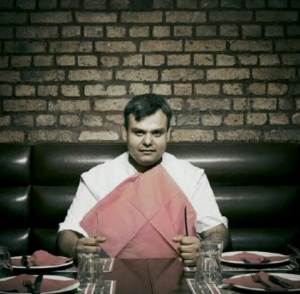 Wasim Tayyab speaks exclusively with Twisted (Credit: Wasim Tayyab)
Wasim Tayyab speaks exclusively with Twisted (Credit: Wasim Tayyab)
“To be honest with you, these days, hunger isn’t a problem,” he says, in an exclusive chat with Twisted. “The first week is usually tough, but then you get used to it. Your stomach shrinks, your willpower increases and then it’s pretty much a walk in the park.”
Wasim owns London Punjabi restaurant Tayyabs, alongside his brothers Aleem and Faleem. It’s a business which has been in his family over five decades, and aged 47, Wasim has spent Ramadan on the premises for more or less his whole life.
The chef might find the Islam holy month easy enough today, but he still recalls the tougher times. In his youth, for example, Wasim used to spend day-after-day packing sweets to sell, in the heat of August (Ramadan changes time every year because it falls depending on the cycle of the moon).
The business was small-scale at that time, and focused on selling savouries and sweets over the holiday, whilst the main restaurant remained closed.
“There was no staff; no manpower like we have now,” he says. “So, we had to do everything ourselves. We’d start at 10 o’clock in the morning and we didn’t finish until about seven or eight the next morning.
“It was really, really hard. The days used to be long and the nights used to be very short. It was hot, and between work and prayers, we had minimal sleep.”
 Wasim’s family restaurant, Tayyabs, is a London institution (Credit: Instagram/ Tayyabs)
Wasim’s family restaurant, Tayyabs, is a London institution (Credit: Instagram/ Tayyabs)
Lack of food and sleep was one thing, but back then Wasim and his brothers had another vice.
“When we were younger, we were also secret smokers,” he laughs. “The hardest thing whilst fasting was not having a fag – and our mum and dad didn’t even know we smoked!”
It’s no surprise, then, that in comparison, today is pretty easy for the Tayyab brothers. They have a much bigger team (including their ever-growing family), the time of year is more favourable, and after so many years, they’ve got Ramadan – both mentally and logistically – down to an art.
Wasim explains they ward off hunger in the kitchen by prepping as many ingredients as they can in between fasts, and measuring everything to the letter, using tried and tested recipes.
“We weigh out the onions, and we’ve got every measurement of salt of the chilli written down, so we don’t have to keep tasting,” he says.
Breaking his fast to taste the food he sends out would never be an option, but if there is somebody who isn’t fasting on shift, they’ll become the “taste-tester of the day”, to ensure food quality stays up to par.
And if it so happens that all the team is all fasting?
“We tend to put less salt in food, because salt can be added but it can’t be taken out,” he explains..”We just tell customers that it’s Ramadan and if they want to add more to their food they can.
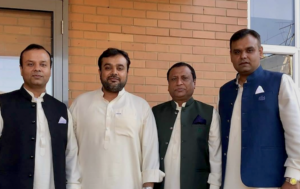 Wasim (far right), alongside his brothers and father-in-law (Credit: Wasim Tayyab)
Wasim (far right), alongside his brothers and father-in-law (Credit: Wasim Tayyab)
“Usually it’s fine, because we know our recipes so well, but if they ask for a salt shaker, they’re very understanding. I wouldn’t break my fast for anything to be honest. It’s a pillar of our faith.”
Like when he was younger, lack of sleep is still the biggest obstacle Wasim has to grapple with in the kitchen.
“I’m going to bed at around 6am and getting up at 10am,” he says. “In the restaurant, we don’t finish until midnight, and we don’t get out the doors some days until half one, sometimes two.
“Then, when you get home you have to unwind for your prayers and sit down with mum for a bit because she misses us during the day when we’re at work.
“I eat [Suhoor] before sunrise, and then go to bed, but not long afterwards, the kids go to school and they disturb me.
“On average, I probably get about four or five hours a day, so the tiredness is something that I struggle with more than hunger. At work, you can sit down on a chair and almost doze off.”
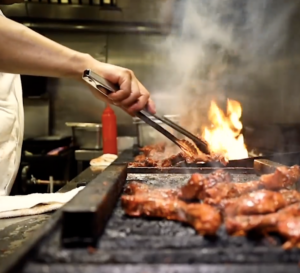 Chefs have to prepare food over a hot grill without any water (Credit: Instagram/ Tayyabs)
Chefs have to prepare food over a hot grill without any water (Credit: Instagram/ Tayyabs)
To get through such exhaustion, the team at Tayyabs have to work together as a unit, and help lift each other through.
“Whether it’s ‘you have your break, you look tired’, or ‘you break your fast first today, because I did it yesterday,’ people are just nice to each other over Ramadan,” Wasim says.
“You always need a good team in the kitchen, but during Ramadan you take it up a notch because there’s an understanding that we’re all going through it.
“Even if it’s, like, minus two [degrees] outside, the kitchen is very hot. Fires are burning, the grill is on,” he says. “So people take turns on the tandoor.
“If you helped someone, you know they’re going to do the same for you tomorrow. It definitely brings everyone much closer together.”
Even long after Ramadan, Wasim says the teamwork exhibited throughout the month ultimately helps the restaurant remain such a well-oiled machine. It lays down a level of respect, he says, and after a month of ups and downs, everyone exits the month with a stronger bond.
While lunchtime services are usually emptier over Ramadan (because those customers who observe it are fasting, and the rest feel somewhat guilty visiting a Muslim-run restaurant) by dinner time, “tickets start flying into the kitchen”, ahead of Iftar – which is the close of the fast.
“When you’re busy, time stops,” Wasim says. “It might sound funny, but being in the busy kitchen actually keeps his mind off any need for food.
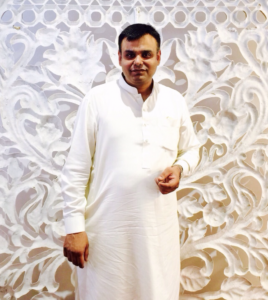 Wasim says he’ll miss Ramadan when it’s gone (Credit: Wasim Tayyab)
Wasim says he’ll miss Ramadan when it’s gone (Credit: Wasim Tayyab)
“We work through the tickets one by one, look at the timings for those who are fasting, and try to get plates out as quickly as possible so that everyone can break the fast with our food.
“[In the kitchen], we usually take it in turns to take 30 seconds once Iftar begins; have some dates, do a little prayer and drink water, milk and a couple of pieces of fruit.
“Then, as soon as the water and the sugar hits your veins, you just feel blessed, and you’re like ‘right, let’s feed everyone.’ It’s a really nice feeling”.
Speaking days before 2022’s Ramadan is due to come to an end, Wasim says in a funny way he’ll miss it when it’s over.
“I’m always a little sad when I know I’m eating my last Iftar,” he says. “I almost feel guilty, because Ramadan is about self control, and being a better person.”
It’s this willpower he says he really gets to finesse whilst working as a chef over the holiday.
“Fasting makes you disciplined,” he says. “You’re controlling your tongue as well as your mind. It just puts a little barrier there.
“It’s spiritual. You’re doing it your God. For the will of Allah”.
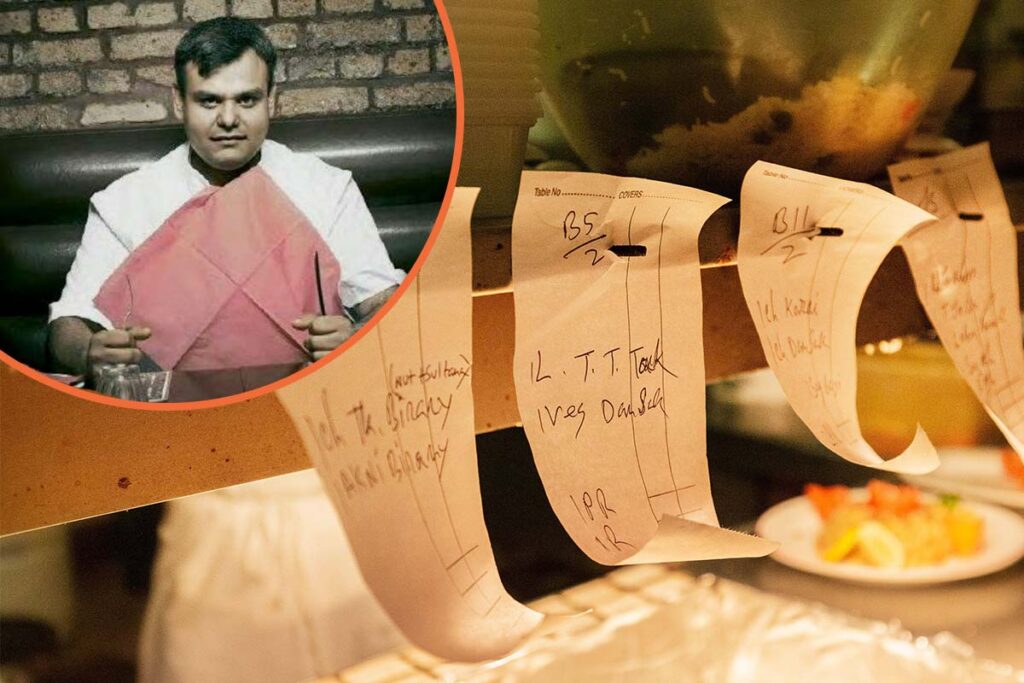


.jpg_dU0O4c?tr=w-2560,f-webp,q-70)